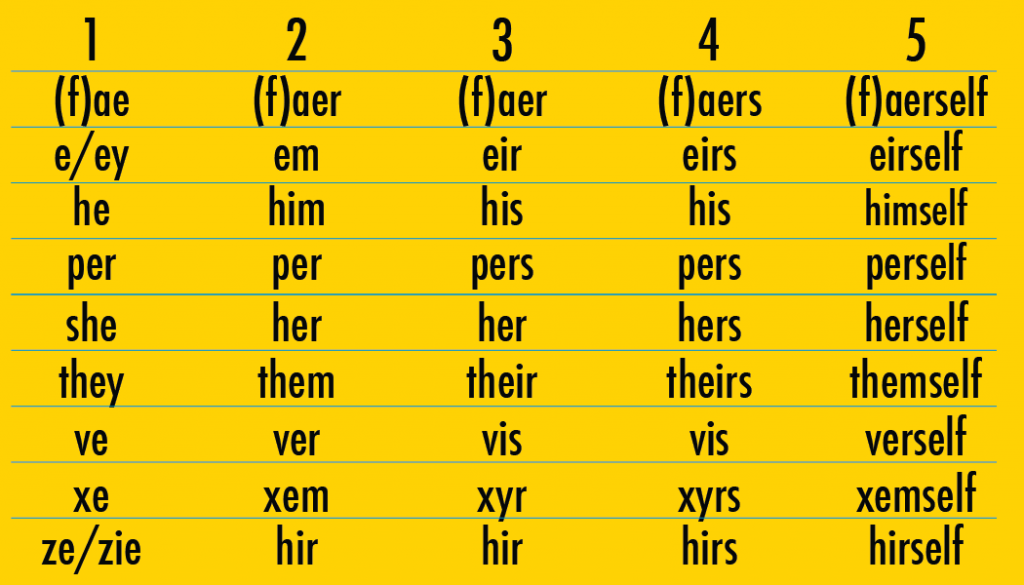A preferred pronoun, or preferred gender pronoun (PGP) is a pronoun an individual would like people to use in reference to them. Some people prefer the term personal gender pronoun because "preferred" may imply that using the correct pronoun is only preferred, rather than a key part of someone's identity that should be used for respectful communication. A person's pronouns reflect their gender identity, which may or may not correspond with their sex and/or gender expression.
Using, providing and requesting a person's pronouns has become increasingly commonplace over the past decade as a way of drawing attention to the role they play in language and their power. It has also been argued that when everyone provides their pronouns, this helps promote equity and inclusion for transgender and genderqueer people.
The most commonly used pronouns are:
- She/her: Often considered feminine pronouns used to refer to women and girls, but may also be used by nonbinary, genderqueer or genderfluid people.
- HJe/him: Often considered masculine pronouns used to refer to men and boys, but may also be used by nonbinary, genderqueer or genderfluid people.
- They/them: The most commonly-used gender-neutral pronoun (although there are many others). May be used by people who do not identify as part of the gender binary, as well as their supporters (or anyone else who chooses it!).
 A list of some of the pronouns people use and how to use them.
A list of some of the pronouns people use and how to use them.
Source: LGBTQ+ Resource Center, University of Wisconsin, Milwaukee
The preferred pronouns for cisgender people are those that match their birth genders. That is, cisgender men prefer he, his and him. Cisgender women prefer she, her and hers.
Transgender people, intersex people and people with other gender identities that fall outside the traditional binary may choose from a range of preferred pronouns. Some people prefer others use the pronouns traditionally associated with the gender identity they present as. Others prefer more gender-neutral pronouns like they, them, theirs, ze, hir, hirs, ve, ver, virs, xe, xem, and xyr. Some people reject pronouns altogether as they feel they are impersonal. Instead they prefer to be referred to using their name only.
It is important to remember that pronouns are very personal. Misgendering someone can make them feel alienated or invalidated. Making an effort to get to know and use a person's pronouns is as simple as being kind and showing respect. However, it is only the first step toward embracing someone's gender identity.
While most people’s preferred pronouns will not change, they sometimes do. This may occur for a genderfluid person. A transgender person may also use different pronouns during different stages of their transition.
More About Preferred Pronoun
The use of gender pronouns emerged into mainstream culture in the 2010s. In 2014, Facebook famously added a long list of more than 50 gender identity options for users to choose from; in 2015, they also added the option for users to fill in their own gender. The move received a lot of press (some of it critical), but it did introduce many people to the idea that gender is much more nuanced than the commonly accepted gender binary. By 2020, one in four LGBTQ youths were using nonbinary pronouns, and the American Dialect Society crowned the singular use of "they" as the Word of the Decade (2010-2019.) It has also been accepted as grammatically correct by the Associated Press, Chicago Manual of Style and the Oxford English Dictionary, among others.
Gender neutral pronouns actually have a relatively long history, with some suggesting the desire for neutral pronouns stretches back to the early 1900s or even 1800s. This suggests that people have been looking for more expansive ways to talk about gender for some time.
Unfortunately, while gender pronouns have become increasingly common online, in the workplace and in other institutions, there are still many places (and people) that refuse to accept a gender other than he/him or she/her and/or accept a gender that does not conform to the person's assigned sex at birth and/or gender presentation.
Misgendering a person, whether by using incorrect pronouns or by other means, can cause significant harm. Studies have found that it can make people feel stigmatized and cause them to suffer negative effects to their self esteem. Pronoun use is just one way to help make spaces friendly for all people, regardless of gender.



